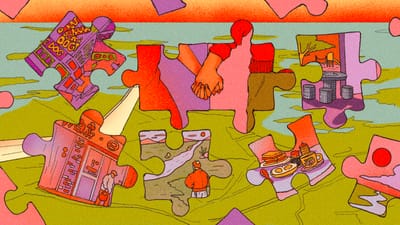Just 10 minutes away from the grey blocks that make up the Ministry of National Development in Singapore sits an architectural treasure: the Nanyang Hakka Federation located on 20 Peck Seah Street. The building’s quiet facade and current mixed usage as an office building belies its historical significance—the land it sits on was once the gravesite of Singapore’s earliest Chinese settlers. Since the Federation’s founding in 1929, it has served as a community centre for the country’s powerful and well-connected Hakka community. Lee Kuan Yew was perhaps the country’s most prominent Hakka, while the Federation’s first chairman was the “Tiger of Nanyang” Aw Boon Haw, the Chinese tycoon who founded Tiger Balm.
Enter the banquet hall near the entrance of the building and the air of stealth wealth becomes apparent, with the ceilings adorned by golden-framed portraits of Hakka elders staring down at you. In a silent nod to the community’s roots in global trade, the building’s five floors are occupied by shipping companies and others offering anodyne-sounding corporate services, such as auditing, management consulting, and the “wholesale trade of goods without a dominant product”. The last is what Asia Trading and Construction Private Limited purports to do, and this is where lies the darker reality behind the glass-panelled doors of the Nanyang Hakka Federation.
The US has accused Asia Trading of fuelling the Kremlin’s war in Ukraine by being a front for a clandestine arms dealing network linked to the Russian defence industry. According to the Treasury’s sanctions enforcement unit, Asia Trading and its Singaporean director, Serena Ng Bee Lin, had conspired to sell Russian military helicopters to an unspecified Latin American government on behalf of the sanctioned state-owned defence company Rostec, ultimately contributing to the Kremlin’s war chest. This transnational web of weapons dealers, shell companies and faceless middlemen designed to evade Western sanctions was dubbed the “Zimenkov network”, named after its alleged leader Igor Vladimirovich Zimenkov, a Russian-Cypriot dual national and his son Jonatan.
Not much is known about Ng, apart from that fact that she’s in her sixties and her name is listed as a donor and supporter of the Singapore Council of Women’s Organisations, a prominent umbrella network of local feminist groups. Local corporate registry records also list the address of Five Star Resort, the former name of Asia Trading, to a semi-detached house in the affluent neighbourhood of Holland Grove. The trail goes cold there.
Similarly, we know little about another Singaporean, 64-year-old Kwek Kee Seng. Last November, the US State Department announced a US$5m (S$6.8m) bounty for information about Kwek and his activities in North Korea. According to the FBI, Kwek has been accused of international money laundering and enabling the regime’s nuclear proliferation programme by smuggling oil to the country through his shipping and terminal operations company Swanseas Port Services Pte Ltd, since early 2019. The regime is known for diverting the impoverished nation’s public purse towards its weapons development programme. Recent reports indicate how smuggling has accelerated its missile development, with the North Korean government now preparing to launch a military spy satellite weeks after firing more than 80 missiles, including a new intercontinental ballistic warhead.
Kwek and Ng join a growing list of Singaporeans either sanctioned, wanted, or extradited to the US to face justice for smuggling everything from perfumes to bomb parts to dictatorships as far flung as Russia and North Korea, or conflict zones closer to home, such as Myanmar. Despite our government’s efforts to combat money laundering, terrorism financing and proliferation financing—a stated goal of the Monetary Authority of Singapore (MAS)—it would appear like many criminals still choose to operate from here.
If so, our open ports and capital markets are being abused to facilitate conflicts and wars around the world. It should be an issue of grave concern to all Singaporeans.





